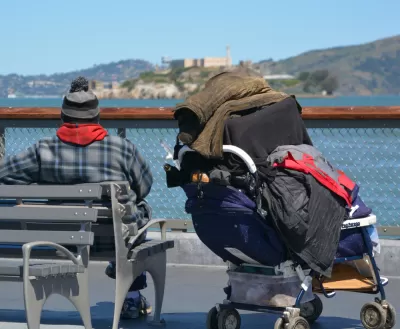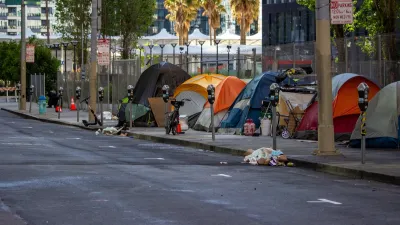Desperate times. Desperate measures.

The San Francisco Department of Public Works is stuck between a rock and a hard place.
A group of neighbors banded together to pile a bunch of boulders on a sidewalk in San Francisco to deter homeless from sleeping on the sidewalk, subsequently inspiring repeated acts of civil disobedience and an ongoing debate about how to respond to the city's growing homeless population.
A mysterious band of neighbors placed the boulders on the sidewalk on Clinton Park, a street in the Mission neighborhood of San Francisco, as first reported by Teresa Hammerl.
At the time, a "San Francisco Public Works department spokeswoman told KTVU the city had no part in putting the boulders here, and since they aren't blocking the sidewalk, there are no plans to remove them," according to an early national article on the subject by Travis Fedschun.
The controversy has been on a roll since protestors countered the grassroots act of anti-homeless architecture by gathering to drink Rolling Rock and roll the rocks into the street. A "cat and mouse game" ensued, according to another article by Joe Fitzgerald Rodriguez, with the city replacing the rocks and the protestors rolling the rock back into the street.
Since the back and forth, Public Works Director Mohammed Nuru has given tacit approval to grassroots anti-homeless tactics by saying the more permanent solution to the controversy is larger rocks. "Nuru commended the neighbors for banding together to fund the 'solution,'" according to Rodriguez.
An additional article by Brock Keeling is devoted to feedback from local residents about the boulders and the attention they brought to the homelessness crisis in the city by the bay.
FULL STORY: City solution to Clinton Park anti-homeless measures: ‘larger boulders’

Maui's Vacation Rental Debate Turns Ugly
Verbal attacks, misinformation campaigns and fistfights plague a high-stakes debate to convert thousands of vacation rentals into long-term housing.

Planetizen Federal Action Tracker
A weekly monitor of how Trump’s orders and actions are impacting planners and planning in America.

In Urban Planning, AI Prompting Could be the New Design Thinking
Creativity has long been key to great urban design. What if we see AI as our new creative partner?

King County Supportive Housing Program Offers Hope for Unhoused Residents
The county is taking a ‘Housing First’ approach that prioritizes getting people into housing, then offering wraparound supportive services.

Researchers Use AI to Get Clearer Picture of US Housing
Analysts are using artificial intelligence to supercharge their research by allowing them to comb through data faster. Though these AI tools can be error prone, they save time and housing researchers are optimistic about the future.

Making Shared Micromobility More Inclusive
Cities and shared mobility system operators can do more to include people with disabilities in planning and operations, per a new report.
Urban Design for Planners 1: Software Tools
This six-course series explores essential urban design concepts using open source software and equips planners with the tools they need to participate fully in the urban design process.
Planning for Universal Design
Learn the tools for implementing Universal Design in planning regulations.
planning NEXT
Appalachian Highlands Housing Partners
Mpact (founded as Rail~Volution)
City of Camden Redevelopment Agency
City of Astoria
City of Portland
City of Laramie





























